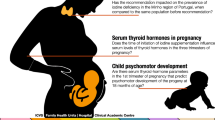Abstract
The effects of gestational hypothyroxinemia on the neurointellectual prognosis of children in the first year of life living in an industrial city (megalopolis) with mild iodine deficiency were studied in 13 children of mothers with thyroid hormone-corrected gestational hypothyroxinemia in the first trimester and 10 children of mothers with normal levels of free thyroxine by assessing cognitive functions at ages six, nine, and 12 months using the Gnome mental development scale. The results showed that maternal free thyroxine levels at the early stages (5–9 weeks) of pregnancy correlated significantly with the coefficients of mental development among the children at ages 6, 9, and 12 months, i.e., represented one of the factors defining the neuropsychological development of offspring. Early (not later than nine weeks) correction of gestational hypothyroxinemia with levothyroxine at a mean daily dose of at lest 1.2 µg/kg improved the neurointellectual prognosis of the offspring, increasing the coefficient of mental development of children to 92–97 points during the first year of life, i.e., to the level of development of mental functions of children born to mothers with normal thyroxine levels.
Similar content being viewed by others
References
É. Gaitan, Thyroid Diseases [Russian translation from English], L. I. Bravermann (ed.), Moscow (2000), pp. 359–377.
É. P. Kasatkina, Lechashchii Vrach, No. 2, 24–28 (2003).
V. V. Fadeev, S. V. Lesnikova, and G. A. Mel’nitskii, Klin. Tireoidol., 1, No. 2, 17–32 (2003).
V. F. Chuprun, Hygienic Assessment of the Role of Carbon Dioxide and Genetic Factors in the Etiology of Endemic Goiter [in Russian], Author’s abstract of thesis for doctorate in medical sciences, Moscow (1984).
F. Delange, Proc. Natl. Acad. Sci. USA, 59, No. 1, 75–79 (2000).
D. Glinoer and F. Delange, Thyroid, 10, 871–887 (2000).
D. Glinoer et al., Thyroid, 11, No. 5, 471–481 (2001).
D. Glinoer, Horm. Res., 55, No. 3, 109–114 (2001).
R. Z. Klein, J. D. Sargent, P. R. Larsen, et al., J. Med. Screen., 8, No. 1, 18–20 (2001).
B. E. Man, Crit. Rev. Clin. Lab. Sci., 3, 203–225 (1972).
G. Morreale de Escobar, M. J. Obregon, and D. Escobar del Rey, J. Clin. Endocrinol. Metabolism., 85, No. 11, 3975–3977 (2000).
V. J. Pop, J. L. Kuijpest, A. L. Baar, et al., Clin. Endocrinol., 50, No. 2, 149–155 (1999).
Author information
Authors and Affiliations
Additional information
__________
Translated from Problemy Éndokrinologii, Vol. 51, No. 5, pp. 27–31, September–October, 2005.
Rights and permissions
About this article
Cite this article
Kasatkina, É.P., Samsonova, L.N., Ivakhnenko, V.N. et al. Gestational hypothyroxinemia and cognitive function in offspring. Neurosci Behav Physiol 36, 619–624 (2006). https://doi.org/10.1007/s11055-006-0066-0
Received:
Issue Date:
DOI: https://doi.org/10.1007/s11055-006-0066-0




